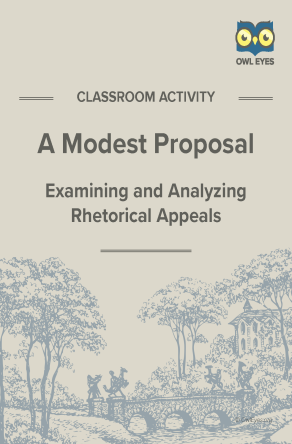A Modest Proposal Rhetorical Appeals Activity
- 11 pages
- Subject: Ethos, Logos, Pathos, Rhetorical Devices, Lesson Plans and Educational Resources
- Common Core Standards: RI.11-12.3, RI.11-12.5, RI.11-12.6, RI.11-12.9, RI.9-10.3, RI.9-10.5, RI.9-10.6, RI.9-10.9
Additional A Modest Proposal Resources
Product Description
When the Anglo-Irish essayist Jonathan Swift (1667–1745) decided to address the famine ravaging Ireland in 1729, he published “A Modest Proposal.” Swift’s proposal was for the Irish to eat their own children in order to ward off hunger. This solution was, of course, satirical, meant to criticize the many daft schemes set forth by the Irish politicians and clergymen of the day. Though Swift’s argument is essentially a joke, his broader purpose is serious and his rhetorical methods are rigorous. He employs the rhetorical appeals of ethos, pathos, and logos to craft a sharp, stirring, and well-reasoned essay, despite the undercurrent of irony.
Skills: analysis, close reading, drawing inferences from text, examining the impact of diction on audience
About This Document
The Owl Eyes Rhetorical Appeals activity gives students an opportunity to practice examining and analyzing the Aristotelian rhetorical appeals: ethos, pathos, and logos. Students will analyze selected rhetorical appeals from the text to determine which appeal they best represent and explain the appeal’s impact. The main components include the following:
- A brief introduction to the text
- A detailed handout on rhetorical appeals
- A list of tips for spotting rhetorical appeals
- A step-by-step guide to activity procedure
- A detailed answer key for teachers
In completing this worksheet, students will be able to examine and analyze Aristotle’s three rhetorical appeals in order to evaluate works of rhetoric and the techniques they employ.







